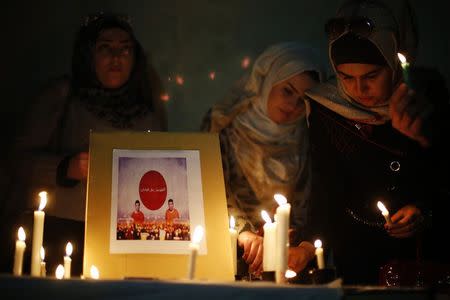Japanese firms face wake-up call on threats of violence - security expert

TOKYO (Reuters) - Japanese companies with overseas operations are showing greater interest in seeking advice on security and other threats, after the Islamic State militants killed two citizens of Japan, a risk management specialist said. Japan has long been an investor in, and fostered close ties with, countries in the Middle East, from where it gets more than 80 percent of its crude oil supplies and a third of its gas, but has rarely been targeted by extremists in the region. That may change as Prime Minister Shinzo Abe pushes for a more muscular stance overseas and Islamic State militants pledged to target Japan after Abe announced $200 million in non-military aid for countries contending with the militants, who control large swathes of Iraq and Syria. "This is definitely a wake-up call ... to have criminals on TV saying, 'We are going to kill Japanese,' that's pretty powerful, especially when they do it in front of your eyes," Bruce McIndoe, president of iJET, an Annapolis, Maryland-based risk management advisory company, said in an interview. McIndoe was in Tokyo to talk to clients after setting up an office in the city recently. Compared with a year ago, Japanese companies are taking more interest in security for overseas personnel, he said. Typically Japanese companies would "buy insurance, which is economic protection," McIndoe said. "Those insurance policies come with some type of assistance, which is usually medical, and then they tick the box and think they are done." Now the companies are "leaning forward, they are listening, they are asking questions and ultimately buying," the services of risk management specialists, he said. Inpex Corp, Japan's biggest energy explorer, JX Holdings , its largest crude importer, and other companies contacted by Reuters all said they had stepped up security overseas and issued alerts to staff. The country's largest travel agency JTB said it had received more calls than usual from customers about travel to the Middle East and North Africa. Islamic State posted videos over the weekend and a week earlier showing the killing of Japanese journalist Kenji Goto and another hostage, Haruna Yukawa. [ID:nL9N0T403E] Abe's government rejected any suggestion it acted rashly and stressed the assistance was humanitarian, while vowing to help bring the killers to justice. (Reporting by Aaron Sheldrick, Mari Saito, Yuka Obayashi, Osamu Tsukimori; Writing by Aaron Sheldrick; Editing by Clarence Fernandez)
